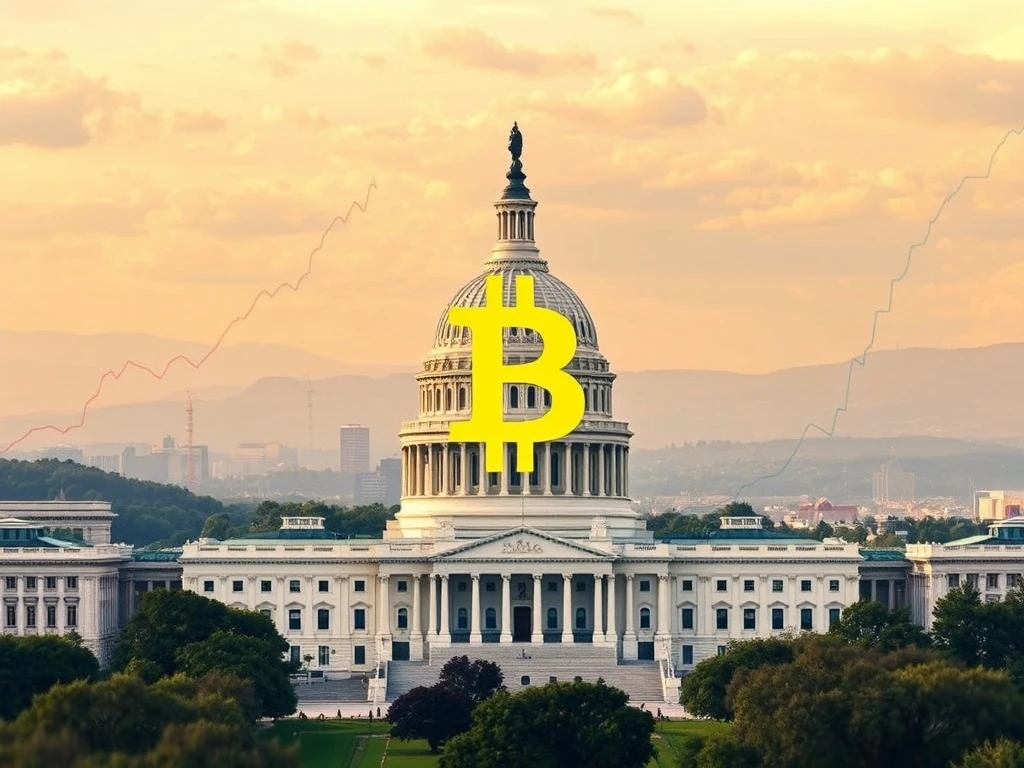Bitcoin Set to SOAR? Trump’s Big Beautiful Bill and $5 Trillion US Debt Hike Fuel Predictions

The recent passage of President Trump’s ‘One Big Beautiful Bill Act’ by the US Congress has sent ripples through the economic landscape. While the bill itself contains no specific provisions for digital assets, market observers are pointing to its potential indirect impact on Bitcoin (BTC). What exactly does this bill entail, and why might it influence the price of Bitcoin?
Understanding Trump’s ‘Big Beautiful Bill’
Passed on July 3rd along partisan lines, the ‘Big Beautiful Bill’ is primarily a budget proposal that significantly increases the US government’s ability to borrow money. This move has drawn criticism from various political figures and commentators, highlighting the scale of the proposed fiscal changes.
- The bill raises the national debt ceiling by a historic $5 trillion.
- It includes tax reductions, notably for higher earners and increased state and local tax deductions for some.
- Estate tax exemptions were also increased.
- To offset these changes, the bill proposes cuts to certain benefits programs and relies on increased tariffs.
Notably absent from the final version were several anticipated amendments related to cryptocurrency taxation. Efforts to include provisions addressing issues like airdrops, staking rewards, de minimis exceptions for small transactions, and the ‘double tax’ on Bitcoin miners did not make it into the passed legislation.
Why the $5 Trillion US Debt Hike Matters for Bitcoin
Despite the lack of direct crypto clauses, the substantial increase in US Debt is seen by some analysts as a potential tailwind for Bitcoin. The logic often follows a path connecting increased government borrowing to monetary policy and asset values.
According to crypto analyst Ranjay Singh, a significant rise in debt can potentially lead to increased money printing over time. This expansion of the money supply is often associated with a decrease in the purchasing power of traditional currencies, a phenomenon known as inflation. Assets perceived as stores of value or those with limited supply, like Bitcoin, are sometimes seen as hedges against such inflationary pressures.
Nigel Green, CEO of deVere Group, noted that markets have already begun reacting to the bill, with rising long-term yields and increases in assets like oil, gold, and Bitcoin. This suggests investors may be seeking assets outside of traditional fiat currencies as concerns about currency devaluation grow.
Inflation Fears Drive Interest in Bitcoin
The core argument for Bitcoin benefiting from the ‘Big Beautiful Bill’ centers on the potential for future inflation fueled by increased government spending and debt. As the US government borrows and spends more, the total supply of dollars in the economy could increase, potentially leading to a decrease in the value of each dollar.
Historically, assets like gold have been favored during times of inflation uncertainty. In the digital age, Bitcoin has emerged as a comparable, albeit more volatile, alternative. Its fixed supply cap of 21 million coins is often cited as a key feature that makes it resistant to the kind of supply inflation possible with fiat currencies.
While Bitcoin holders may welcome potential price increases driven by these macroeconomic factors, it’s important to consider the broader economic context. The bill’s tax cuts and spending changes are expected to have wide-ranging effects, and the increase in tariffs could impact global trade dynamics.
What About Crypto Specific Legislation?
While the ‘Big Beautiful Bill’ didn’t include crypto tax fixes, legislative efforts focused specifically on digital assets are still underway in Washington. The week of July 14 is being dubbed ‘Crypto Week’ by key Republican figures in the House, with plans to advance several important bills.
Upcoming legislative proposals include:
- The CLARITY Act: A framework bill for the crypto industry.
- The Anti-CBDC Surveillance State Act: A bill aimed at preventing a US central bank digital currency.
- The GENIUS Act: Legislation focusing on stablecoin regulation and issuer standards.
Furthermore, Senator Cynthia Lummis has introduced a separate bill specifically addressing the ‘double tax’ issue for Bitcoin miners and proposing a de minimis exemption for small crypto transactions. These efforts show that while the large budget bill overlooked crypto details, the push for clearer digital asset regulation continues.
The Path Forward for Bitcoin and US Policy
The passage of the ‘Big Beautiful Bill’ highlights a significant shift in US fiscal policy, marked by increased borrowing and spending. For Bitcoin, this could translate into long-term bullish sentiment driven by fears of currency devaluation and inflation, even as the short-term market experiences volatility.
Simultaneously, dedicated efforts in Congress during events like ‘Crypto Week’ signal a growing recognition of the need for clear rules around digital assets. The interplay between broad economic policy changes and targeted crypto legislation will likely shape the environment for Bitcoin and the wider digital asset market in the coming months.
While the ‘Big Beautiful Bill’ may not have directly addressed crypto, its potential macroeconomic consequences could make it a surprising catalyst for Bitcoin’s future trajectory, setting the stage for interesting times ahead in both economics and digital asset policy.










